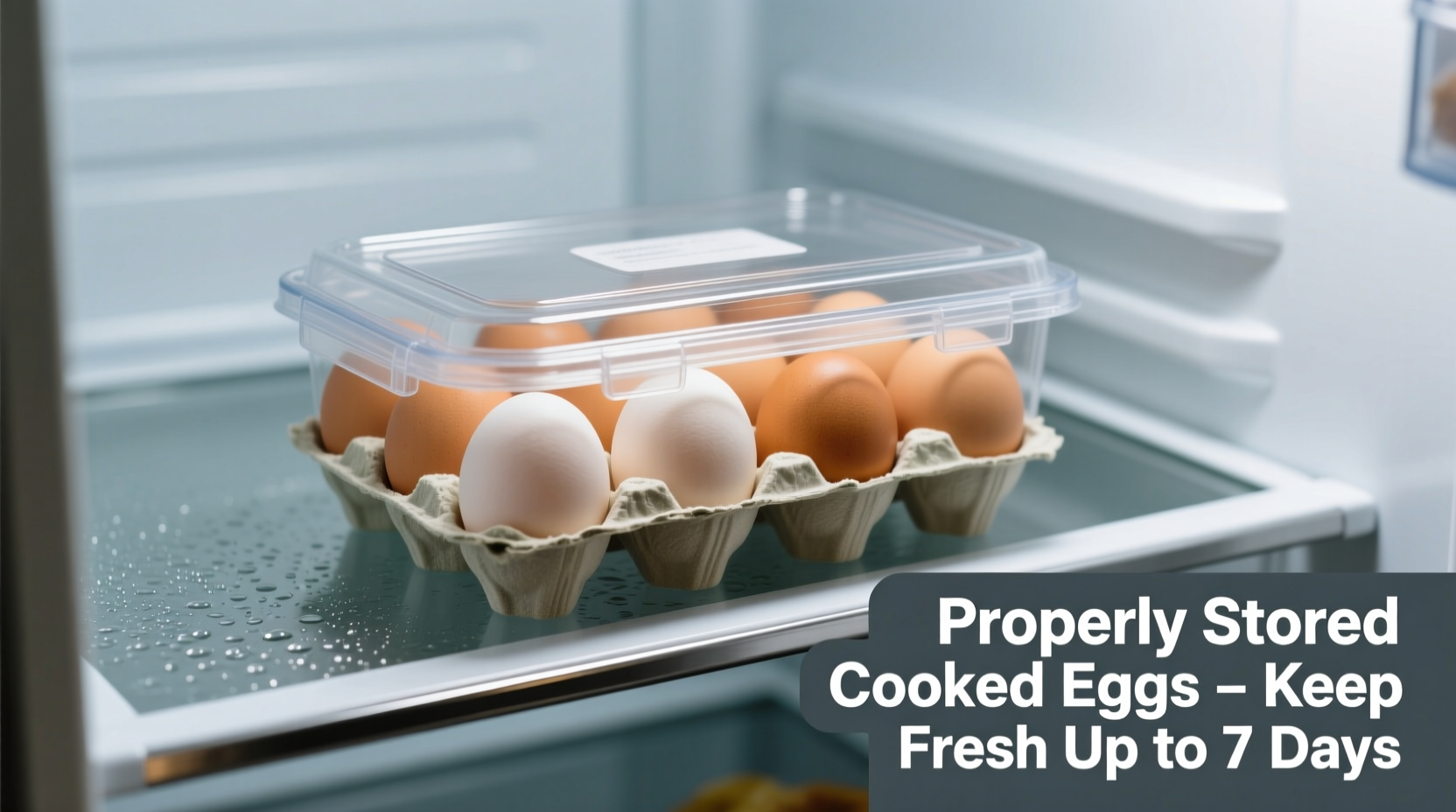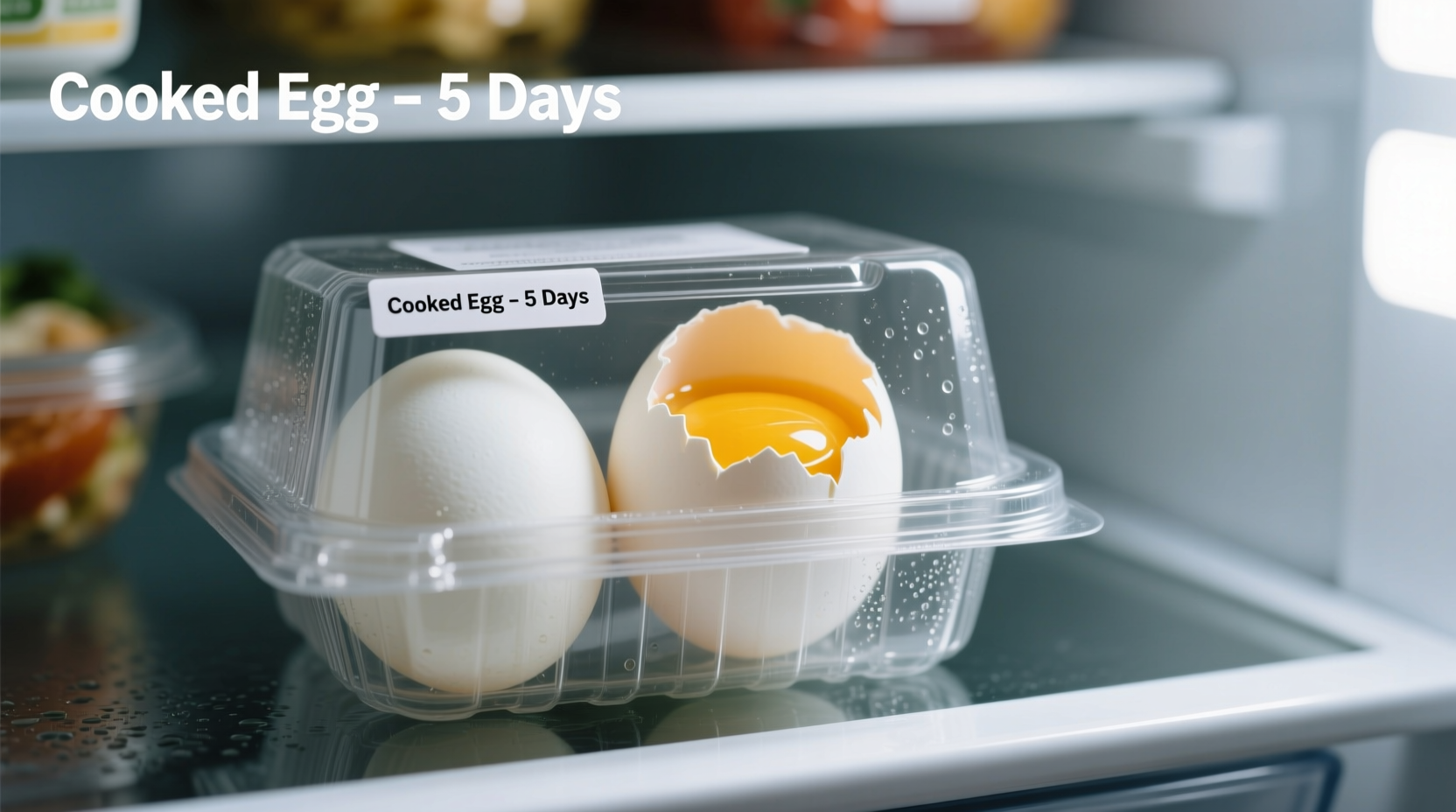Understanding how long cooked eggs stay fresh isn't just about avoiding food waste—it's critical for preventing foodborne illness. Each year, millions of people experience food poisoning from improperly stored eggs, with Salmonella being the primary culprit. As someone who's worked with professional kitchens and home cooks for over 15 years, I've seen how simple storage mistakes turn perfectly good meals into health hazards.
Why the 3-4 Day Rule Matters for Cooked Eggs
Unlike raw eggs with their natural protective coating, cooked eggs lose their defense against bacteria during preparation. The USDA Food Safety and Inspection Service confirms that cooked eggs enter the "danger zone" (40°F-140°F) where bacteria multiply rapidly as soon as they cool down from cooking temperature.
Here's what happens to cooked eggs during refrigeration:
| Time After Cooking | Bacterial Activity | Egg Quality |
|---|---|---|
| 0-2 hours | Minimal growth | Optimal texture and flavor |
| 2-24 hours | Noticeable multiplication | Slight moisture loss |
| 24-72 hours | Rapid growth | Dry texture, sulfur odor begins |
| 72+ hours | Dangerous levels | Unpleasant texture, strong odor |
This timeline comes from temperature abuse studies conducted by the FDA Center for Food Safety and Applied Nutrition. Their research shows that Salmonella bacteria can double in population every 20 minutes in the danger zone, making timely refrigeration essential.
Factors That Shorten Cooked Egg Shelf Life
Not all cooked eggs last the full 4 days. These conditions accelerate spoilage:
- Temperature fluctuations: Opening your refrigerator frequently raises internal temperature. The USDA recommends keeping cooked eggs in the main compartment (not the door) where temperatures stay more consistent
- Moisture exposure: Eggs left uncovered absorb refrigerator odors and lose moisture faster. Always store in airtight containers
- Cross-contamination: Placing cooked eggs near raw meat or seafood introduces harmful bacteria
- Cooking method: Hard-boiled eggs last slightly longer (up to 7 days in shell) than scrambled or fried eggs due to less surface area exposure

How to Spot Spoiled Cooked Eggs
Don't rely solely on the calendar—check these spoilage indicators before eating:
- Smell test: Fresh cooked eggs have a mild odor. A strong sulfur or rotten smell means they've spoiled
- Texture check: Slimy or excessively dry texture indicates bacterial growth
- Visual inspection: Discoloration (greenish, pinkish, or moldy spots) means immediate disposal
- Container condensation: Excessive moisture inside storage container suggests bacterial activity
The Food and Drug Administration emphasizes that "when in doubt, throw it out" is the only safe approach with potentially spoiled eggs. Unlike some foods, you cannot remove the spoiled portion and safely eat the rest.
Maximizing Freshness: Proper Storage Techniques
Follow these professional kitchen practices to get the most from your cooked eggs:
- Cool quickly: Place cooked eggs in an ice bath for 5-10 minutes before refrigerating to rapidly pass through the danger zone
- Airtight is essential: Use containers with tight-fitting lids or heavy-duty zip-top bags with air pressed out
- Label everything: Write the preparation date on containers using waterproof marker
- Store strategically: Keep cooked eggs on middle refrigerator shelves, away from raw proteins
- Reheat properly: When using leftovers, heat to 165°F (74°C) to kill any potential bacteria
According to the USDA's FoodKeeper app data, properly stored hard-boiled eggs maintain optimal quality for 7 days in their shells, but only 3-4 days once peeled. This distinction matters for meal preppers who might think shell protection extends indefinitely.
Food Safety Risks of Consuming Expired Cooked Eggs
Eating cooked eggs past their prime isn't just unpleasant—it's potentially dangerous. The Centers for Disease Control and Prevention reports that Salmonella causes approximately 1.35 million infections, 26,500 hospitalizations, and 420 deaths in the United States annually.
Symptoms of Salmonella poisoning typically appear 6 hours to 6 days after consumption and include:
- Diarrhea (often bloody)
- Fever and chills
- Abdominal cramps
- Nausea and vomiting
Vulnerable populations including young children, pregnant women, older adults, and immunocompromised individuals face higher risks of severe complications. When preparing eggs for these groups, I always recommend consuming within 48 hours for maximum safety.
Key Takeaways for Safe Egg Storage
Remember these essential guidelines for cooked egg safety:
- Refrigerate cooked eggs within 2 hours of preparation (1 hour if room temperature exceeds 90°F/32°C)
- Store at or below 40°F (4°C) in airtight containers
- Consume within 3-4 days for optimal safety and quality
- Discard immediately if any spoilage signs appear
- Hard-boiled eggs last longer in shell (up to 7 days) than peeled
Following these simple practices protects your health while reducing unnecessary food waste. When meal prepping with eggs, I recommend cooking only what you'll consume within this safe window rather than pushing storage limits.
Frequently Asked Questions
Can you eat cooked eggs after 5 days in the refrigerator?
No, cooked eggs should not be consumed after 5 days in the refrigerator. The USDA Food Safety and Inspection Service recommends consuming cooked eggs within 3-4 days for safety. After this timeframe, bacterial growth may reach dangerous levels even if no visible spoilage signs appear.
How long do hard-boiled eggs last in the fridge unpeeled?
Unpeeled hard-boiled eggs maintain safety for up to 7 days when properly refrigerated at or below 40°F (4°C). The shell provides an additional barrier against moisture loss and bacterial contamination. Once peeled, consume within 3-4 days as the protective layer is removed.
What happens if you eat cooked eggs that have been in the fridge too long?
Consuming cooked eggs stored beyond the recommended timeframe can cause foodborne illness, primarily from Salmonella bacteria. Symptoms typically include diarrhea, fever, abdominal cramps, and vomiting appearing 6 hours to 6 days after consumption. Vulnerable populations face higher risks of severe complications requiring hospitalization.
Can you freeze cooked eggs to extend their shelf life?
Yes, cooked eggs can be frozen for up to 1 year when properly packaged. Scrambled eggs and egg patties freeze best, while hard-boiled eggs develop rubbery textures when frozen. Always cool completely before freezing in airtight containers with minimal air exposure. Thaw overnight in the refrigerator before reheating to 165°F (74°C).
Why do restaurant eggs sometimes last longer than homemade ones?
Restaurant kitchens typically maintain stricter temperature control with commercial refrigeration units that hold more consistent temperatures (34-38°F). They also follow precise cooling protocols like ice baths and shallow storage containers that rapidly bring food through the danger zone. Home refrigerators often experience more temperature fluctuations from frequent door openings.











 浙公网安备
33010002000092号
浙公网安备
33010002000092号 浙B2-20120091-4
浙B2-20120091-4